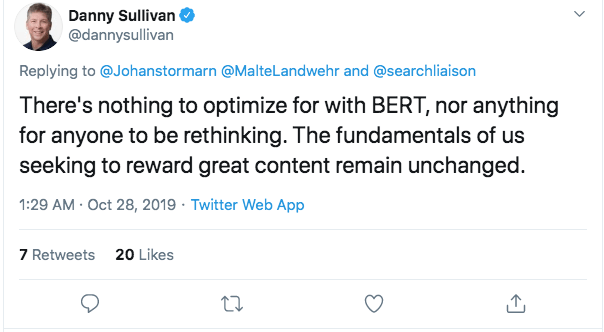On October 21, 2019, Google started rolling out its newest major search update—the BERT algorithm. Although Google announced its purpose is to help better understand user search intent and it should only impact about 10% of searches, it’s generating its fair share of discussion among the SEO community. Here’s a high-level look at what you need to know.

What is BERT?
BERT. What does it stand for? Last year, Google introduced a neural network-based technique for natural language processing (NLP) pre-training called Bidirectional Encoder Representations from Transformers. That’s BERT, for short. This technology is open-sourced and equips anyone using it with the resources to train their own question-answering system.
That sounds like a lot of hoopla, so to put it simply: Google just got a lot better at recognizing patterns and understanding the way humans naturally speak.

How Does BERT Work?
So how does BERT work? Well, its purpose is to use natural language processing to further understand the user’s search intent based on queries. With a higher focus on language and how we use it, BERT focuses on examining the full conversational context of a search query rather than focusing on each individual word and the order in which they appear.
This allows Google to differentiate between slight nuances in language that happen when the same words are used in different contexts. This is especially useful for longer queries, where there may be several keyword combinations that could apply to the situation. Here’s one example that Google provided in its announcement.

The key takeaway to understanding how BERT works is in the word “bidirectional”. In the past, the order of terms within a search query has greatly impacted the search results. Now, BERT learns context based on all surrounding words rather than just the single word immediately before or after a term.
How Will BERT Impact Google Search?
BERT was not a small update by any means, even if your company didn’t see an immediate impact on your keyword rankings. With its focus on longer, conversational queries, you should notice that your long-tail keywords are more affected than your shorter, higher traffic keywords.
In fact, many companies aren’t paying attention to or even tracking their long-tail keywords as much as their shorter keywords because of that very reason—they tend to be lower traffic. But the great thing about long-tail keywords is how specific they are. With the BERT algorithm update, you should see more accurate, qualified traffic coming to the pages that rank highly on the long-tail SERPs.
Should You Optimize Content For Google BERT?
The short answer is, “no.”
Google (via Danny Sullivan’s Twitter) has stated there’s nothing to optimize for BERT. Just keep creating great content for your users. The biggest mistake you can make in SEO is trying to cater to a robot or “trick” Google. User experience is integral in making your website rank higher in the SERP. Old “black hat” tactics just aren’t going to cut it. As Google gets smarter, those tactics will become more and more outdated.
As we always say, don’t let your marketing tactics become prehistoric. Are you ready to take your digital marketing strategy into the modern world of 2020? We can help.







